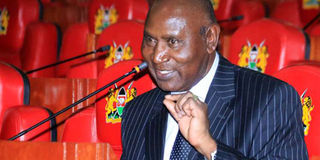Reduce number of MPs and MCAs, audit team says

Auditor-General Edward Ouko before the National Assembly's Budget and Appropriations Committee at Parliament Buildings in Nairobi on October 13, 2016 when a parliamentary working group handed in a report on the socioeconomic impact of the Constitution to the group. The report recommends that the number of Members of Parliament and County Assembly be reduced. PHOTO | JEFF ANGOTE | NATION MEDIA GROUP
What you need to know:
- Audit team says Kenya has more representatives compared to countries with similar population and size of economy.
- It does not specify ideal number of elected representatives.
Kenyans are overrepresented and reducing the number of MPs and MCAs will go a long way in slashing government spending, a team led by Auditor-General Edward Ouko has said.
“Kenya has more representatives (number of MPs, senators and MCAs) compared with countries with similar population and size of economy. The number of MPs and senators alone is above the global average,” said the team that audited the social and economic impact of the Constitution promulgated in August, 2010.
However, the team, which presented its findings to the Budget and Appropriations Committee of the National Assembly on Thursday, did not specify what number of elected representatives would be ideal.
“Kenyan representatives are also some of the most highly paid MPs and MCAs in the world,” the team said in its report. “They are paid even more than representatives in some of the advanced economies.”
To cap the salaries of elected representatives, the team recommended that the Salaries and Remuneration Commission develop guidelines for Parliament to follow so that 60 per cent of their gross earning is paid as basic salary and 40 per cent as allowances.
Currently, their salaries are based on a set amount while allowances are paid for attending meetings and mileage reimbursed according to distance travelled.
Kenya has 416 lawmakers; 67 senators and 349 members of the National Assembly. It also has 2,526 MCAs.
Although the audit team has also proposed a change in the system of representation, it stopped short of saying which way the country should go, leaving that to the political class. Kenya adopted a presidential system after the 2013 General Election. Before that, it had a hybrid of presidential and parliamentary systems.
WAGE BILL
The Working Group, as the audit team is known, said there has also been an increase in both public expenditure and wage bill. However, this cannot be blamed on devolution or the implementation of the Constitution alone. There has also been an increase in national government development programmes.
Devolution was rated as a success, with improvements in healthcare provision, increased expenditure on early childhood education, agricultural services, sinking of more boreholes in arid areas and increased connectivity to tap water.
However, devolution’s gains have been watered down by corruption and wastage of public funds, which are now evident at the grassroots.
“Wastage has been there but because services are closer to the people, it is now also closer. People are now seeing corruption and we hope that the institutions, like us, that do continuous work on the ground for deterrence and prevention can work,” said Mr Ouko.
The Auditor-General has recommended that government agencies that are involved in the wastage of resources suffer budget cuts as punishment, with MPs then playing their role in enforcing this. In its latest report on government accounts, the Office of the Auditor-General pointed out agencies and ministries that wasted Sh14.4 billion in the 2014/2015 financial year. This is a new way of reporting on the expenditure of public money.
The team also noted that counties have a bloated workforce and carry an unnecessarily large wage bill from the workers they inherited from local authorities. Some of the workers are redundant while others overpaid.
WEAK LAWS
The team said devolution was implemented without a proper policy or a thorough understanding of what it is meant to achieve, resulting in the late enactment of laws and the development of weak laws to implement it.
Among the effects of the hurried implementation of devolution were illogical differences in the salary scales of employees of the devolved governments.
“We found instances where drivers earn more than the officers they carry, and that is because they negotiated their salary when they were getting employed by the county government. We found a driver who earns Sh70,000 and the officer they carry earns Sh45,000,” said Prof Karitu Kanyinga, a member of the Working Group.
Mr Ouko described the Constitution as “very ambitious” and responding to concerns raised over many years, which made it very prescriptive. However, Kenyans have a hard time living by its ideals.
“The values enshrined in the Constitution are rarely adhered to. Lack of prudence in use of public resources, lack of integrity among State officers and other public servants, and recruitment practices that fail to reflect the regional and ethnic diversity of the country are clearly preventing the full realisation of the benefits of the Constitution,” he said.
The Working Group was, however, criticised for failing to come up with specific and drastic recommendations, with members of the Budget committee saying the proposals in the interim report presented in May last year were clearer.




